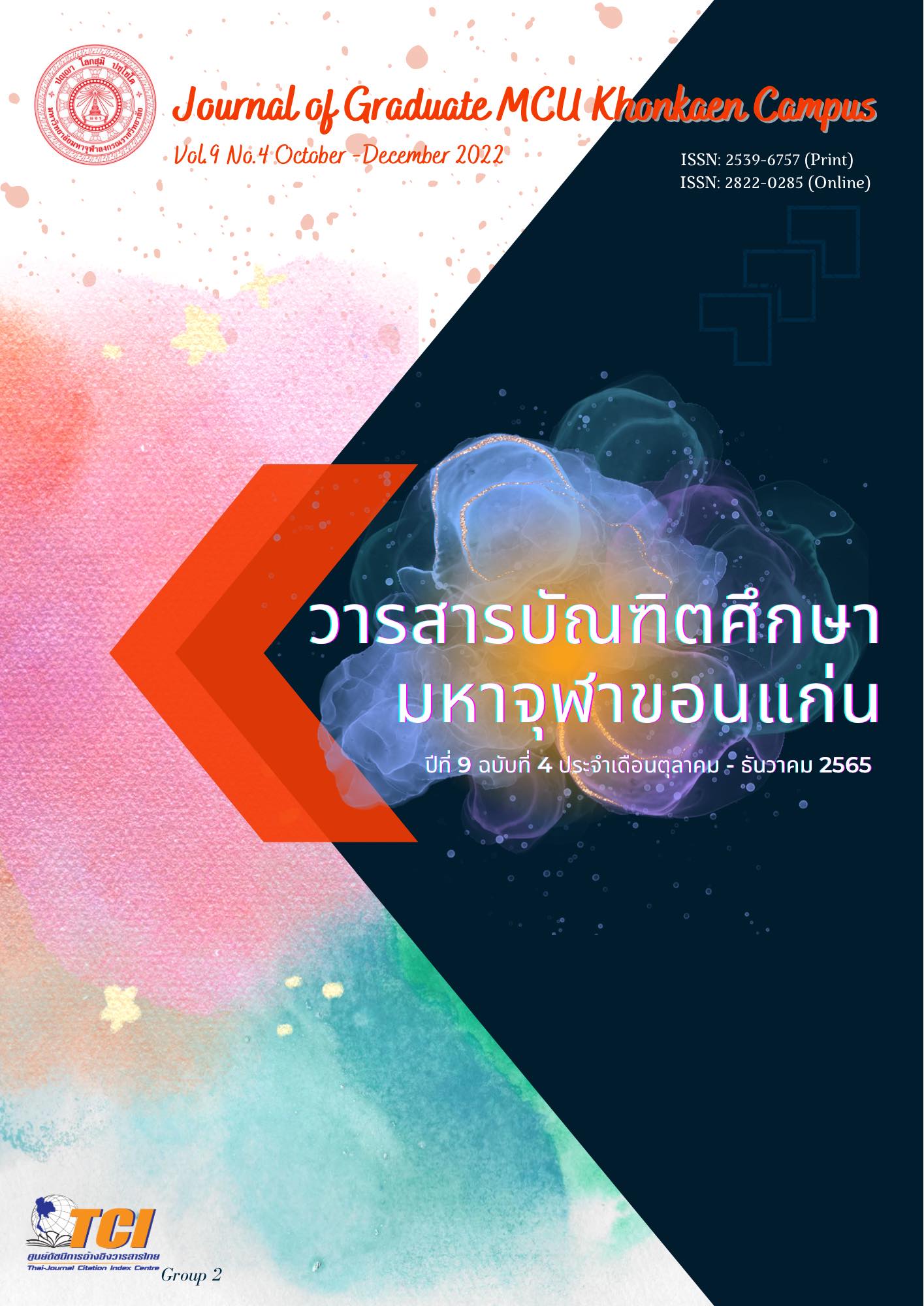The development of a learning management model based on the teaching approach that integrates the philosophy of sufficiency economy to promote desirable characteristics of grade 4 students Social studies, Religion, and Culture Department
Main Article Content
Abstract
The main objective of this research is to development of a learning management model based on the teaching approach that integrates the philosophy of sufficiency economy to promote desirable characteristics of grade 4 students Social Studies, Religion, and Culture Department. It is research and development. The researcher conducted the research in 4 steps: 1) A study of the problems and needs of learning management according to the teaching integrating the philosophy of sufficiency economy. 2) to create a learning management model. 3) to experiment with the learning management model and 4) to assess the learning management model. The tools used for data collection were a rating scale questionnaire, interview form, group conversation recording form data analysis. Analyzed by finding the frequency, mean, percentage, standard deviation, and content analysis.
The research findings were as follows:
1. The results of the study of problems and demands in learning management according to the teaching integrating the philosophy of sufficiency economy as a whole found that the students' parents thought that desirable characteristics of students at present It is at a very practical level. And there is a need for learning management according to teaching that integrates the philosophy of sufficiency economy to promote the desirable characteristics of students at a high level.
2. The results of the development of the learning management model found that the learning management model in line with the teaching integrated the philosophy of sufficiency economy. There are seven key components: principles, objectives, learning management process, social system, support system, conditions for implementing the model, and evaluation. The process of learning management consisted of 5 steps: Step 1 Understanding. Step 2 Content Learning. Step 3 Practice the Activity. Step 4 Applying and Step 5 Conclusion. The elements of the model found that the learning management model was appropriate. Accuracy and utilization possibilities accounted for 100 percent. The results of the audit were 83.81/83.22, considered to be more effective than the specified criteria.
3. Assessment results of desirable characteristics of grad 4 students studying with a learning management model based on teaching integrating the philosophy of
sufficiency economy Social Studies, Religion and Culture Department found that 3.1) when comparing the scores of cognitive characteristics of sufficiency economy learning Social Studies, Religion and Culture Department. It was found that the students' test scores after using the learning management model were significantly higher than before using the learning management model at the .05 level and 3.2) students had scores for assessing desirable characteristics according to the Sufficiency Economy Philosophy. Overall, it's a very good level. 4. The satisfaction assessment results found that students who study with a learning management model in line with teaching that integrates the philosophy of sufficiency economy. To promote desirable characteristics of grade 4 students in the Social Studies, Religion and Culture Department Satisfaction at a high level
Article Details

This work is licensed under a Creative Commons Attribution-NonCommercial-NoDerivatives 4.0 International License.
References
กระทรวงศึกษาธิการ. (2551). ตัวชี้วัดและสาระการเรียนรู้แกนกลางกลุ่มสาระการเรียนรู้สังคมศึกษา ศาสนาและวัฒนธรรมตามหลักสูตรแกนกลางการศึกษาขั้นพื้นฐาน พุทธศักราช 2551. กรุงเทพฯ: ชุมนุมสหกรณ์การเกษตรแห่งประเทศไทย.
______. (2553). แนวทางการบริหารสถานศึกษาพอเพียง. กรุงเทพฯ: โรงพิมพ์ดี.
กิตติชัย สุธาสิโนบล. (2555). การพัฒนารูปแบบการจัดการเรียนการสอนแบบบูรณาการตามแนวพุทธ เพื่อสะท้อนแนวคิดปรัชญาเศรษฐกิจพอเพียงในบริบทแห่งสังคมไทยยุคปัจจุบัน. (รายงานการวิจัย). กรุงเทพฯ: มหาวิทยาลัยศรีนครินทรวิโรฒ.
ชุลีกร สายเกียรติวัติ และ พิชญาภา ยวงสร้อย. (2560). การพัฒนารูปแบบการจัดการเรียนรู้ตามหลักปรัชญาของเศรษฐกิจพอเพียง เพื่อส่งเสริมมโนทัศน์ในการดำเนินชีวิตอย่างพอเพียงในวิถีอาเซียนสำหรับนักเรียนชั้นประถมศึกษา. วารสารศึกษาศาสตร์ มหาวิทยาลัยนเรศวร, 19(1), 219-230.
นิรมล หมั่นเรียน. (2555). ผลการจัดกิจกรรมการเรียนรู้โดยโครงงาน เรื่อง ปรัชญาเศรษฐกิจพอเพียงกลุ่มสาระการเรียนรู้สังคมศึกษา ศาสนา และวัฒนธรรม ชั้นประถมศึกษาศึกษาปีที่ 5. (การศึกษาค้นคว้าอิสระ). มหาสารคาม: มหาวิทยาลัยมหาสารคาม.
มาเรียม นิลพันธุ์ และคณะ. (กรกฎาคม - ธันวาคม 2554). การพัฒนารูปแบบการจัดการเรียนรู้ตามหลักปรัชญาของเศรษฐกิจพอเพียงในรายวิชาชีพครู กรณีคณะศึกษาศาสตร์ มหาวิทยาลัยศิลปากร. วารสารศิลปากรศึกษาศาสตร์วิจัย, 3(1,2), 14-23.
วารีรัตน์ แก้วอุไร และคณะ. (2554). การพัฒนารูปแบบการจัดการเรียนรู้ตามหลักปรัชญาของเศรษฐกิจพอเพียงในรายวิชาชีพครู กลุ่มมหาวิทยาลัยภาคเหนือ. วารสารวิชาการบัณฑิตศึกษา มหาวิทยาลัยราชภัฏนครสวรรค์, 6(17), 13-29.
วิภาพรรณ พินลา. (2559). แนวทางการจัดการเรียนรู้วิชาสังคมศึกษาตามแนวปรัชญาของเศรษฐกิจพอเพียงเพื่อส่งเสริมทักษะการเรียนรู้ของผู้เรียนในศตวรรษที่ 21. Veridian E-Journal, Silpakorn University ฉบับภาษาไทย สาขามนุษยศาสตร์สังคมศาสตร์และศิลปะ, 9(2), 1140-1157.
สำนักงานคณะกรรมการพัฒนาเศรษฐกิจและสังคมแห่งชาติ. (2554). แผนพัฒนาเศรษฐกิจและสังคมแห่งชาติ ฉบับที่ 11 พ.ศ. 2555-2559. กรุงเทพฯ: สำนักงานคณะกรรมการพัฒนาการเศรษฐกิจและสังคมแห่งชาติ สำนักนายกรัฐมนตรี.
สิริวรรณ ศรีพหล. (2556). การจัดการเรียนรู้เพื่อพัฒนาคุณธรรมจริยธรรมตามหลักปรัชญาของเศรษฐกิจพอเพียง. วารสารพัฒนาการเรียนการสอน มหาวิทยาลัยรังสิต, 7(1), 1-30.
______. (2559). การพัฒนารูปแบบการจัดการเรียนรู้ความเป็นพลเมืองดีของนักเรียนตามหลักปรัชญาของเศรษฐกิจพอเพียง สำหรับครูสังคมศึกษา. วารสารวิจัยและพัฒนาหลักสูตร, 6(2), 24-48.
อรุณศิริ จันทร์หล่น และ ภมรพรรณ์ ยุระยาตร์. (2560). การพัฒนาแนวทางพัฒนาคุณลักษณะอันพึงประสงค์ของผู้เรียนสำหรับสถานศึกษา สังกัดสำนักงานเขตพื้นที่การศึกษาประถมศึกษาอุดรธานี เขต 1. วารสารศึกษาศาสตร์ มหาวิทยาลัยมหาสารคาม, 11(3), 185-194.
อัญญรัตน์ นาเมือง. (2556). การพัฒนารูปแบบการจัดการเรียนรู้เพื่อการเรียนการสอนหลักปรัชญาของเศรษฐกิจพอเพียง สำหรับนักเรียนชั้นประถมศึกษา. วารสารมหาวิทยาลัยนราธิวาสราชนครินทร์, 5(3), 96-109.

